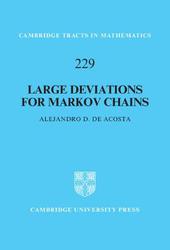
|
Large Deviations for Markov Chains
Hardback
Main Details
| Title |
Large Deviations for Markov Chains
|
| Authors and Contributors |
By (author) Alejandro D. de Acosta
|
| Series | Cambridge Tracts in Mathematics |
|---|
| Physical Properties |
| Format:Hardback | | Pages:230 | | Dimensions(mm): Height 235,Width 158 |
|
| ISBN/Barcode |
9781316511893
|
| Classifications | Dewey:519.534 |
|---|
| Audience | |
|---|
| Illustrations |
Worked examples or Exercises
|
|
Publishing Details |
| Publisher |
Cambridge University Press
|
| Imprint |
Cambridge University Press
|
| Publication Date |
27 October 2022 |
| Publication Country |
United Kingdom
|
Description
This book studies the large deviations for empirical measures and vector-valued additive functionals of Markov chains with general state space. Under suitable recurrence conditions, the ergodic theorem for additive functionals of a Markov chain asserts the almost sure convergence of the averages of a real or vector-valued function of the chain to the mean of the function with respect to the invariant distribution. In the case of empirical measures, the ergodic theorem states the almost sure convergence in a suitable sense to the invariant distribution. The large deviation theorems provide precise asymptotic estimates at logarithmic level of the probabilities of deviating from the preponderant behavior asserted by the ergodic theorems.
Author Biography
Alejandro D. de Acosta is Professor Emeritus in the Department of Mathematics, Applied Mathematics and Statistics at Case Western Reserve University. He has taught at the University of California at Berkeley, Massachusetts Institute of Technology, Universidad Nacional de La Plata and Universidad Nacional de Buenos Aires (Argentina), Instituto Venezolano de Investigaciones Cientificas, University of Wisconsin-Madison, and, since 1983, at Case Western Reserve University. He is a Fellow of the Institute of Mathematical Statistics, and has served on the editorial boards of the Annals of Probability and the Journal of Theoretical Probability. He has published research papers in a number of areas of Probability Theory.
Reviews'This is a treatise on the large deviations for the empirical measure (and additive functionals) of Markov chains. Structural assumptions are kept to a minimum, and great care is taken to separately obtain upper and lower bounds (which under appropriate conditions are shown to be equal). This book summarizes the author's work over the last 40 years and contains a plethora of new, sharpest in its class, results.' Ofer Zeitouni, Weizmann Institute, Israel 'This is a wonderful book. For four decades, Alejandro de Acosta's work in large deviations has been characterized by both its elegance and generality. Large Deviations for Markov Chains synthesizes, refines, and advances the current state of the field in a treatment that is at once rigorous and readable. It belongs on the bookshelf of any mathematician interested in the current state of the subject.' Sandy L. Zabell, Northwestern University 'This is an excellent book, by a top expert in the field, on large deviations for Markov chains in a very general setting. It is a valuable resource for graduate students learning the subject and for researchers in probability theory, statistical mechanics, statistics, engineering, and the sciences.' Firas Rassoul-Agha, University of Utah 'The theory of large deviations is an important way to understand many mathematical and physical models. This book covers the fascinating topic of large deviations for empirical measures and additive functionals of Markov chains with general state space, a subject on which the author is a leading expert who has made crucial contributions. Markov chains represent a large class of stochastic models with a wide spectrum of behaviors. It is remarkable that any universal results, like the ones given in the book, can be formulated for such a large family. It is equally remarkable that the book develops a sharp link between the large deviations and the degree of recurrence of Markov chains. The book does a superb job of clarification, comparison and identification of the rate functions that govern the large deviations.' Xia Chen, University of Tennessee
|